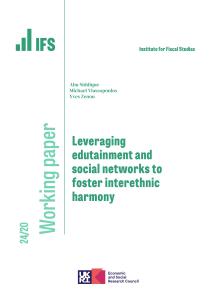In this paper we examine the learning achievement of primary school pupils in Vietnam and explore the relationships between home-background, teacher, peer and school factors and learning progress in Grade 5, using data from Young Lives. We find that disadvantaged pupils receive relatively equitable access in relation to indicators of ‘fundamental’ school quality, a considerable policy success regarding the provision of ‘minimum standards’. However, differences by home advantage are relatively large where more sophisticated ‘opportunities to learn’ are considered, such as the number of hours of instruction received, including through ‘extra classes’, as well as access to learning resources such as computers, internet and non-text books.
Authors

Deputy Research Director
Sonya Krutikova is an Associate Professor of Economics at Manchester University and IFS Deputy Research Director.

Caine Rolleston
Journal article details
- DOI
- 10.1080/03054985.2013.875261
- Publisher
- Taylor & Francis
- Issue
- January 2014
Suggested citation
Krutikova, S and Rolleston, C. (2014). 'Equalising Opportunity? School Quality and Home Disadvantage in Vietnam' (2014)
More from IFS
Understand this issue

Behind the numbers: reassessing investment in skills and training
12 October 2023

If you can’t see it, you can’t be it: role models influence female junior doctors’ choice of medical specialty
24 April 2024

Retirement is not always a choice that workers can afford to make
6 November 2023
Policy analysis

Progression of nurses within the NHS
12 April 2024

Regional variation in earnings and the retention of NHS staff in Agenda for Change bands 1 to 4
10 April 2024

Recent trends in public sector pay
26 March 2024
Academic research

Leveraging edutainment and social networks to foster interethnic harmony
10 May 2024

Keeping the peace whilst getting your way: Information, persuasion and intimate partner violence
17 May 2024

Forced displacement, mental health, and child development: Evidence from Rohingya refugees
10 May 2024